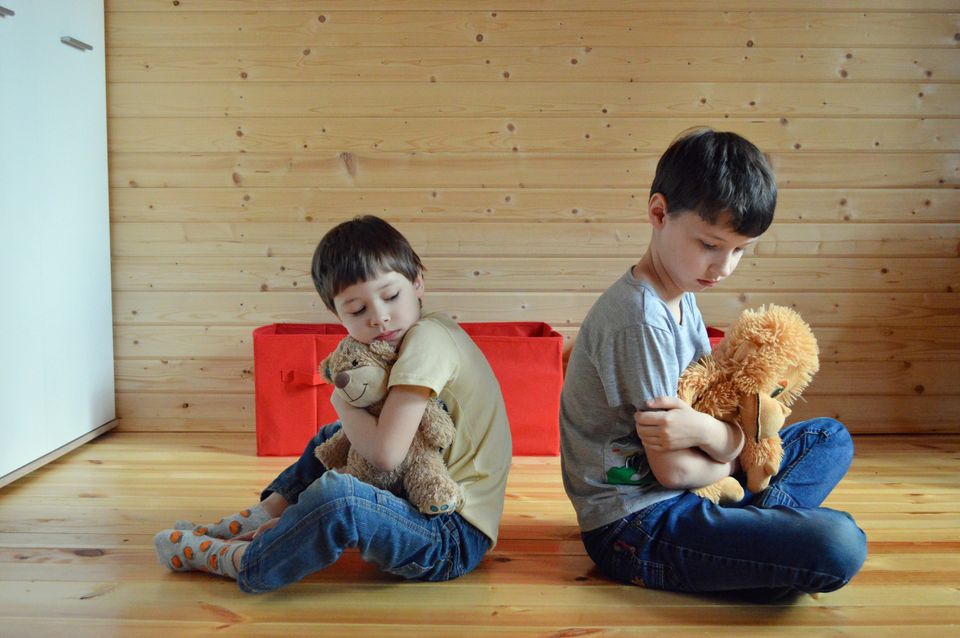Why You Should Apologize to Your Children

As parents, we readily accept that our children will make mistakes. However, a much harder truth to face is that we will sometimes make mistakes regarding our children. Even when we have the best intentions, we can still hurt our children (whether that is physically or emotionally).
As a parent myself, I want to be the best role model for my children. All I want is for them to feel safe with me. They should be able to make mistakes, knowing that I will be the calm harbor for them to return to. My aim is to be patient, kind, and open. I want them to be honest with me, even for the hard truths.
I remember the first time I genuinely apologized to my son. We had ended up in a power conflict. I lost my cool. I shouted at him and he lashed out physically at me. He was just under two years old. I was only just starting to understand why people call it the 'terrible twos.'
We reached a stalemate, both not particularly liking the other at that moment. He hadn't been kind to me, but neither had I to him. I asked him to apologize. He mumbled, "Sorry Maman."
It clicked. I knew I should apologize to him, too. I didn't like that I shouted at him. My behavior was in direct conflict with my aims as a parent. As I prepared to say the words, they were much harder to speak than I anticipated.
Before that moment, I had apologized for the accidental bumps in daily life. Those apologies had come freely and easily without a second thought.
This was different.
This wasn't an accident. I was wrong. And saying 'sorry' to him felt unnatural. I grew up in an authoritarian culture. It was a culture where parents order children and children obeyed. There was a hierarchy, with children at the bottom. Apologizing to a child was against everything I knew and accepted as "the way of doing things."
Finally, I said it. "Sorry," I mumbled, just like him. I felt like a scolded child again, except it was me scolding myself. Just like any toddler, he didn't acknowledge it or laugh in my face. We hugged and the feelings of anger and resentment disappeared.
The next time I apologized to him, it was still difficult. The words choked in my throat. But I did it. Each new apology getting slightly easier than the last. I won't quite say that it comes naturally to me now, but there is less hesitation in saying sorry.
Saying 'Sorry' to your children does not diminish your authority as a parent. In fact, apologizing will make your children respect you more in the long run. Have you ever met someone who never apologizes no matter how wrong they are? How do you feel after interacting with that person? Personally, I feel drained and exhausted. I don't like spending time with that kind of person. I avoid them when I can. I end up not truly believing anything they say because a person who can't say 'sorry' is a person who can't admit when they are wrong.
As a parent, we think of our children as these little beings that remain little forever. But their childhood consists of such a brief span in their lives. They will grow up. They will become adults who recognize right and wrong. They will notice for themselves when we have made mistakes. The relationship we have with our children will greatly depend on how we treat them as they grow up.
Why we should apologize to our children:
- It models good behavior. You are your children's biggest role model and influence in their lives, for better and for worse. If you want children who give genuine apologies when they are wrong, you need to do the same. If you want children who are honest and confess wrongdoings, you need to do the same. It teaches children how to apologize not only to you but other people in their lives.
- It builds trust. You don't trust people who never apologize or admit fault. At some point, your children will realize that you are one of those people, too. Admitting when you are wrong means your children (and the adults they grow up to be) will trust you more easily. They will trust the information you share and they will also trust that you have their best interest at heart.
- It teaches them it is okay to make mistakes. Although no one likes making mistakes, they are an essential part of learning and growing as human beings. If you never admit wrongdoing, you never grow as a person. You make the same mistakes over and over. You remain stubborn, stagnant, and resentful of others. Mistakes are a part of human nature. But the critical element is embracing them, learning from them, and moving forward.
- It repairs the relationship between you and them. During arguments and conflict, usually, both individuals come out of it upset and resentful. Apologizing is an easy way to calm tempers and start to rebuild that bond. It is a positive way of moving on from the conflict and coming up with a solution together.
Apologizing is one step of the equation. The apology needs to be genuine and convey regret, understanding, and responsibility-taking. A fake apology can only make the situation worse. Imagine someone said a comment to you that was mean and uncalled for. Feeling the pressure to apologize, they roll their eyes and say, “Sorry if I hurt your feelings.” You would leave that situation feeling deflated and rightfully upset. The relationship you have with that person will remain strained.
How to apologize to your children (or anyone):
- Recognize their feelings and what you did wrong: "I'm sorry I scared you when I yelled."
- Accept the responsibility for the wrong behavior: "I should not have yelled at you."
- Explain why it happened: "I yelled because I was feeling frustrated." It is important to take full responsibility. Even though your child may have been acting out (causing the frustration), it is your responsibility to control your own emotions.
- Offer solutions: "Next time, I will take a deep breath when I'm frustrated."
- Be clear, concise, and use age-appropriate language: Keep it short and sweet.
- Ask how they feel: "Did I make you upset/ angry/ scared?"
- Offer reparations: "What can I do to make you feel better?" "How can I fix things?" "Do you want a hug?"
No relationship lives without conflict. Mistakes are a part of being human, but growth comes from learning from those moments. Maintaining strong relationships with others, especially our children, requires constant attention and care. In times of conflict, we all need to accept responsibility for wrongdoing and repair the bonds that have been affected.




